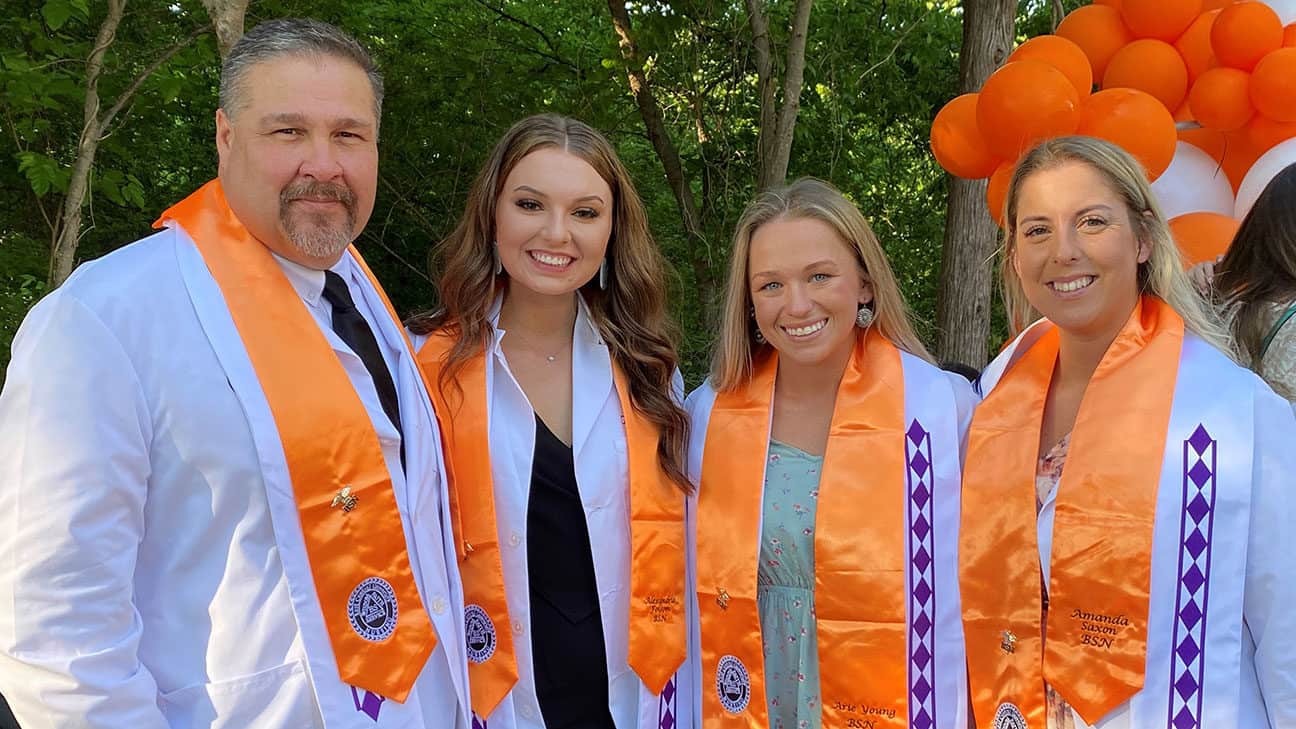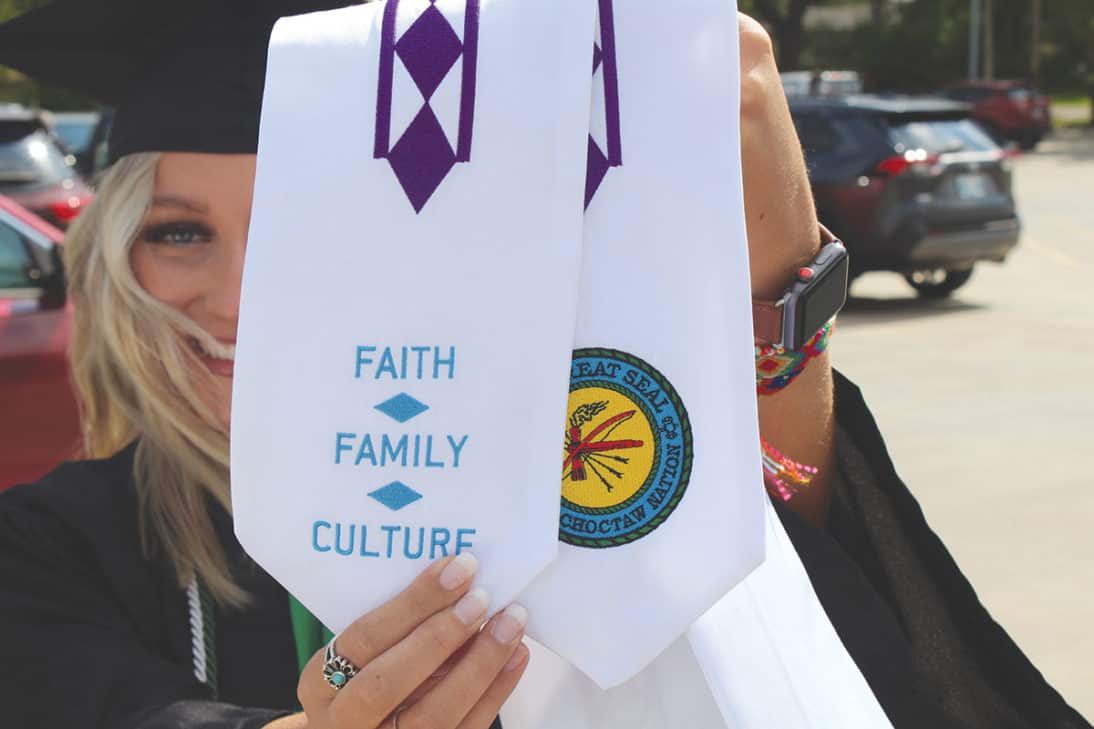
Jeremy Loper, Alexandria Folsom, Arie Young and Amanda Saxon recently graduated from the nursing program through ECU at SOSU. Jeremy started with Career Development back in 2016 and earned his Certified Nurse Aid license through Kiamichi Technology Center, and has worked as a CNA throughout college. He plans to start his master's in nursing soon. Alexandria began her college career at Grayson College before transferring to SOSU. Arie started at Murray State College taking prerequisite courses before deciding to go for her bachelor's degree. Amanda got her CNA through KTC in 2009, followed by a certificate for Medical Office Assistant before deciding to pursue her bachelor's degree in nursing.
CNO programs help Choctaw students succeed
Published July 1, 2021By Shelia Kirven
Choctaw tribal members planning to attend a vocational school, college or university may qualify for extra support from Choctaw Nation’s Higher Education and Career Development programs.
The Higher Education Program began in 1984, but in the past three years alone, the program has served over 16,000 students looking to obtain a college degree.
Layla Freeman was one of those students. She graduated from Southeastern Oklahoma State University with a Bachelor of Arts degree in Communication and a minor in Native Studies. According to Freeman, both the Higher Education and Career Development programs were tremendous resources, not only with funding but also with motivation and support, including having a counselor help her identify and develop her educational plan.
Freeman said that Higher Education and Career Development provided scholarship funds each semester based on her grades, hours enrolled and class level.
Career Development also required the completion of a certification related to the degree pursued. The counselor helped Freeman identify a certification, develop an educational plan, map out her degree completion first, then the certification completion.
“I am extremely grateful for both programs and the support they provided me in my journey,” Freeman said.
The Higher Education Program is a scholarship and grant program designed to provide tuition assistance to enrolled Choctaw tribal members attending an accredited college, technical school or university. “Higher Education assists any tribal member of the Choctaw Nation actively pursuing a higher education degree.
Students must be working at a minimum towards an associate degree. Please contact the Higher Education for further details to help you achieve your educational goals,” said Amanda Lee, Director of the Higher Education program.
The Career Development Program was established in 2007. Each year, the program assists over 3,500 students. The goal of the Career Development Program is to enhance the lives of Choctaw tribal members by providing opportunities for education and training that lead to industry-recognized certifications or licenses and self-sustaining employment.
Program services include career guidance services, assessment, academic remediation, financial assistance for quality training, soft skills training and employment services.
Dylan Grant is a 28-year-old truck driver from Lebanon, Oklahoma, who obtained his CDL license through the Career Development Program.
Grant said he visited with a Career Development counselor who gave him a career assessment test to determine his career interests after deciding that he was not interested in continuing in a college/ university setting. The counselor helped him explore alternative options and asked if he had ever considered driving a truck.
Though Grant said he had never explored that possibility previously, he decided he wanted to give it a try. Grant is now employed with a food warehousing and redistribution company as a driver. He has been there three years and is very happy with his career choice.
“They offered opportunities that I would not be able to access myself. Most people don’t have the money to try a truck driving school to see if they like it and find out they don’t and stop doing it,” explained Grant. “I definitely would never have done it myself unless they had given me the opportunity. It ended up being a very good fit for me. It’s probably what I will do until I retire.”
Penny James, the program’s director, said that Career Development assists with tuition, fees, and books at approved career technology centers, licensures, colleges and universities. The program also assists in the purchasing of required uniforms. For those who already have degrees and need a certification for their jobs, the program may help with that as well. Career Development follows the student until they are employed, as their status is not completed with the program until the participant has completed training and becomes employed. Participants also receive assistance with resumes, interview training and soft skills.

Career counselors are officed in the largest counties in Choctaw Nation, the Oklahoma City area, in Ardmore and on the campus of Okmulgee OSU-IT. Walk-ins are welcome.
James said, “Career Development is helping tribal members to enhance their lives by career laddering or career latticing through short- or long-term training programs. It is paving the way for tribal members to have substantial income for themselves and their families by obtaining certifications and licensures to become better employed.”
Samantha Manuel was a participant in both the Higher Education and Career Development programs. She went through her undergraduate degree in three years, having earned concurrent hours before starting her degree program at the University of Oklahoma.
“Both programs have been amazing. I have had great outcomes every time I spoke with anyone from Career Development or Higher Education,” said Manuel. She went on to say, “I’m very grateful for it because I wouldn’t be able to come out of OU debt-free without both programs.
I did work for the university, so that cut my debt. But having the Choctaw Nation behind me and wanting to see me have a better education, especially after coming from a poor place in McCurtain County and having the obstacles of being the first person in my family to ever go to college, to being a person who was raised by their grandparents in a very rural area and not being to do a whole lot of things, being able to go to such a prestigious university in the state, and then going all the way to law school has just been amazing. I am grateful to both programs. I looked forward to applying for them each semester, knowing that I was going to have the assistance and the backing of the Choctaw Nation to help me achieve my goals.”
If you would like to see if one of our educational programs can assist you, contact the Higher Education and Career Development programs to visit with staff concerning your educational goals.
For more information on the Career Development Program, visit online or call 866-933-2260.
For more information on the Higher Education Program, call 800-522-6170, or visit online.